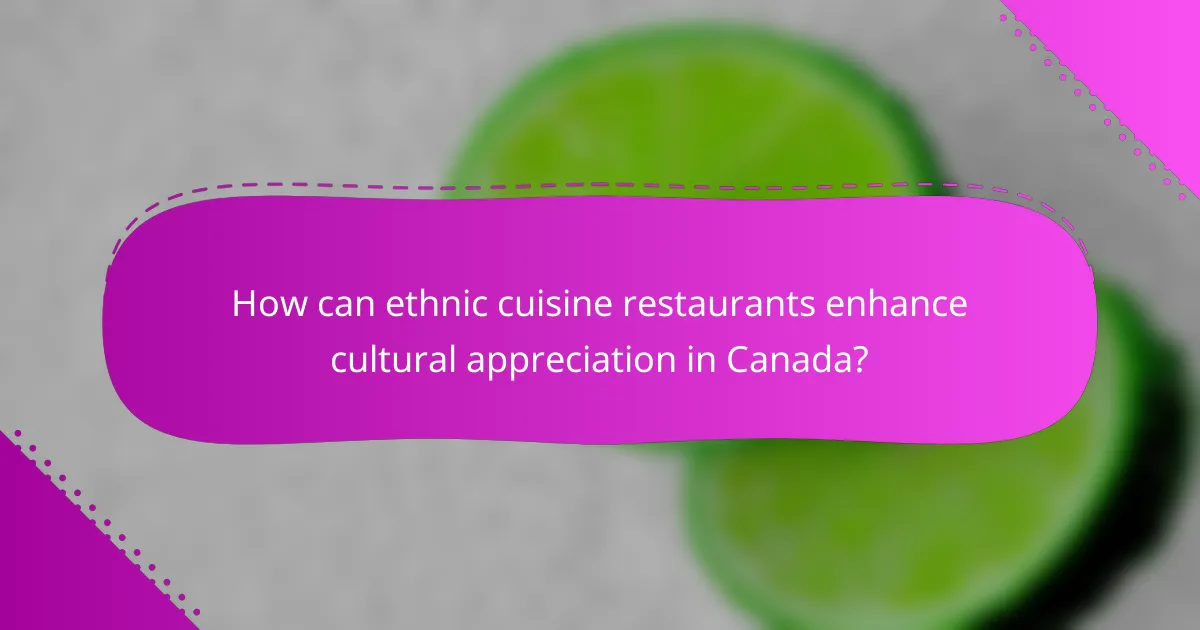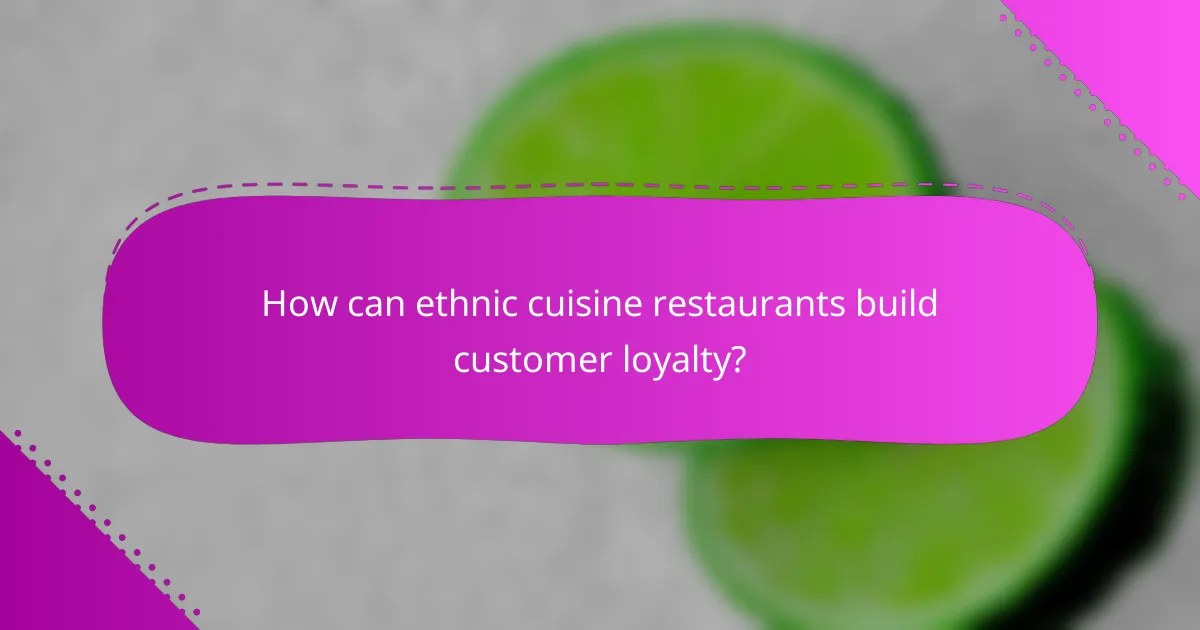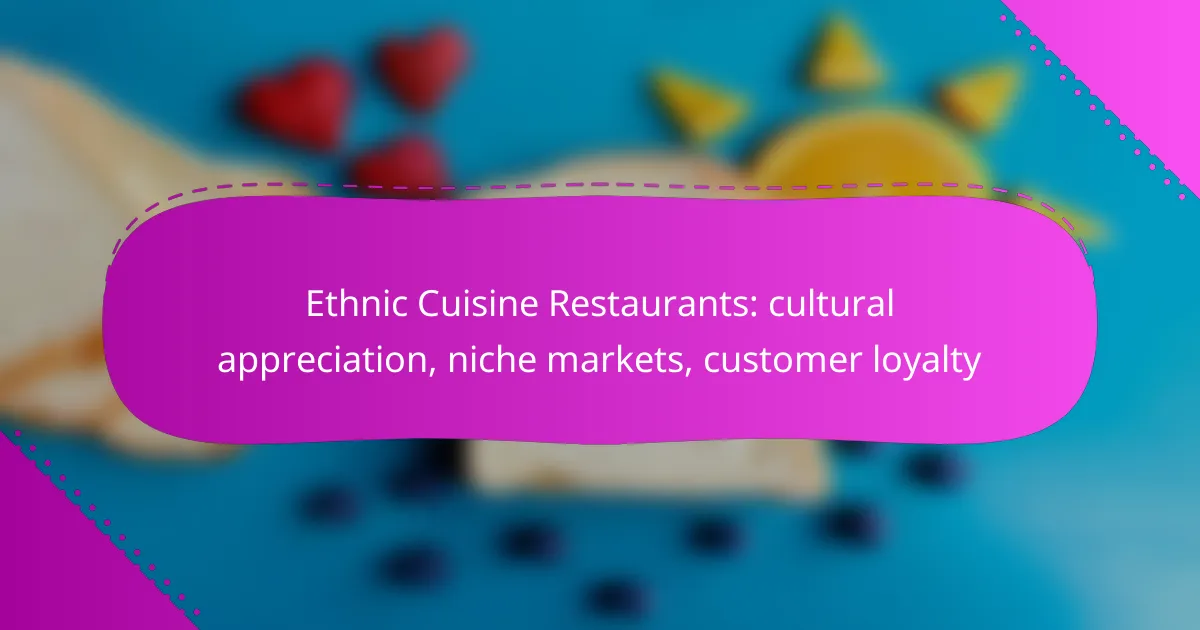Ethnic cuisine restaurants play a vital role in enhancing cultural appreciation by offering authentic culinary experiences that celebrate the diverse backgrounds of their communities. By targeting niche markets and catering to specific dietary preferences, these establishments not only attract a varied clientele but also foster customer loyalty through personalized dining experiences and engaging community interactions.

How can ethnic cuisine restaurants enhance cultural appreciation in Canada?
Ethnic cuisine restaurants in Canada can significantly enhance cultural appreciation by providing authentic culinary experiences that reflect the diverse backgrounds of their communities. By showcasing traditional dishes and engaging with local cultural organizations, these restaurants foster a deeper understanding and respect for different cultures.
Community events showcasing traditional dishes
Hosting community events that feature traditional dishes allows ethnic cuisine restaurants to engage directly with local residents. These events can include food festivals, cooking demonstrations, or themed nights that highlight specific cultural cuisines. Such gatherings not only attract customers but also educate attendees about the history and significance of the dishes being served.
For example, a restaurant could organize a monthly event where chefs prepare and explain the origins of dishes from their home countries. This interactive approach encourages participation and builds a loyal customer base interested in cultural exploration.
Collaborations with local cultural organizations
Collaborating with local cultural organizations can amplify the impact of ethnic cuisine restaurants in promoting cultural appreciation. Partnerships with cultural associations or community groups can lead to joint events, workshops, or promotional campaigns that celebrate specific cultural heritages.
These collaborations can also provide restaurants with access to resources, such as traditional ingredients or expert speakers, enhancing the authenticity of their offerings. For instance, a restaurant might work with a local cultural group to host a heritage month celebration, featuring special menu items and cultural performances.
Incorporating authentic recipes and cooking methods
Incorporating authentic recipes and traditional cooking methods is crucial for ethnic cuisine restaurants aiming to enhance cultural appreciation. Using genuine ingredients and techniques not only ensures the authenticity of the dishes but also honors the culinary traditions of the culture represented.
Restaurants should consider sourcing ingredients from local markets that specialize in ethnic foods to maintain authenticity. Additionally, training staff in traditional cooking methods can elevate the dining experience, allowing customers to taste the true essence of the cuisine. This commitment to authenticity can set a restaurant apart in a competitive market, fostering customer loyalty and cultural respect.

What niche markets can ethnic cuisine restaurants target in Canada?
Ethnic cuisine restaurants in Canada can effectively target niche markets by catering to specific dietary preferences and cultural needs. This approach not only attracts diverse clientele but also fosters customer loyalty through tailored offerings.
Health-conscious consumers seeking organic options
Health-conscious consumers are increasingly looking for organic options in their meals, including ethnic cuisine. Restaurants can appeal to this market by sourcing organic ingredients and promoting dishes that emphasize fresh, whole foods. Highlighting certifications and local sourcing can further attract these customers.
To successfully engage this niche, consider offering a dedicated menu section for organic dishes and clearly labeling items that meet organic standards. This transparency helps build trust and encourages repeat visits.
Vegetarian and vegan ethnic dishes
With a growing number of Canadians adopting vegetarian and vegan diets, ethnic cuisine restaurants can attract these diners by offering plant-based dishes. Many ethnic cuisines naturally include a variety of vegetarian options, such as Indian curries or Middle Eastern falafel, which can be highlighted on the menu.
Creating a separate vegetarian and vegan menu can enhance visibility and appeal. Additionally, promoting the health benefits and unique flavors of these dishes can encourage customers to explore new options and return for more.
Halal and kosher dining options
Halal and kosher dining options are essential for many consumers in Canada, particularly within Muslim and Jewish communities. Ethnic cuisine restaurants can tap into this market by ensuring that their offerings meet these dietary laws, which can include sourcing certified ingredients and maintaining proper preparation practices.
Restaurants should clearly indicate which dishes are halal or kosher on their menus. Engaging with local communities through events or partnerships can also enhance visibility and foster loyalty among these customer bases.

How can ethnic cuisine restaurants build customer loyalty?
Ethnic cuisine restaurants can build customer loyalty by creating unique experiences that resonate with their cultural offerings. This involves implementing strategies like loyalty programs, personalized dining experiences, and an engaging presence on social media.
Loyalty programs with cultural rewards
Loyalty programs that incorporate cultural rewards can enhance customer retention. For example, offering discounts on traditional dishes or exclusive access to cultural events can incentivize repeat visits.
Consider tiered rewards that reflect the restaurant’s cultural heritage, such as free meals on significant cultural holidays or points for trying new dishes. This not only encourages loyalty but also educates customers about the cuisine.
Personalized dining experiences
Creating personalized dining experiences can significantly boost customer loyalty. This can include remembering customers’ favorite dishes or dietary preferences, which makes them feel valued and understood.
Restaurants might also offer customized menus for special occasions, such as birthdays or anniversaries, featuring traditional dishes that hold personal significance. This tailored approach fosters a deeper connection between the customer and the restaurant.
Engaging social media presence
An engaging social media presence helps ethnic cuisine restaurants connect with their audience and build loyalty. Regularly sharing vibrant images of dishes, cultural stories, and behind-the-scenes content can attract and retain customers.
Encouraging customers to share their dining experiences on social media can create a community around the restaurant. Utilizing hashtags related to the cuisine can enhance visibility and foster a sense of belonging among patrons.

What are the key factors for success in ethnic cuisine restaurants?
The success of ethnic cuisine restaurants hinges on several key factors, including authenticity, understanding local demographics, and effective marketing strategies. These elements help create a loyal customer base and ensure a restaurant stands out in a competitive market.
Authenticity of food and service
Authenticity is crucial for ethnic cuisine restaurants as it fosters genuine cultural appreciation among customers. This means using traditional recipes, ingredients, and cooking methods that reflect the cuisine’s heritage.
Additionally, the service should embody the cultural norms associated with the cuisine. For example, a Thai restaurant might incorporate traditional greeting practices, while a Mexican eatery could feature vibrant decor and music that enhance the dining experience.
Understanding local demographics and preferences
Successful ethnic cuisine restaurants must analyze the local demographics to tailor their offerings. This includes understanding the cultural backgrounds of the community and their dining preferences, which can vary significantly from one area to another.
For instance, a restaurant in a diverse urban area might benefit from a fusion menu that combines elements from various cuisines, while a location in a more homogenous community may thrive by sticking closely to traditional dishes. Regular customer feedback can also guide menu adjustments to better meet local tastes.
Effective marketing strategies
Marketing strategies should highlight the unique aspects of the cuisine and the restaurant’s authenticity. Utilizing social media platforms to share visually appealing images of dishes and engaging stories about the cuisine can attract a wider audience.
Moreover, collaborations with local influencers or participation in community events can enhance visibility. Offering promotions or loyalty programs can also encourage repeat visits, fostering customer loyalty in a niche market.

How do cultural events impact ethnic cuisine restaurants?
Cultural events significantly enhance the visibility and appeal of ethnic cuisine restaurants, drawing in diverse crowds and fostering a sense of community. These occasions create opportunities for restaurants to showcase their unique offerings and build lasting customer loyalty.
Increased foot traffic during festivals
Cultural festivals often attract large crowds, leading to increased foot traffic for ethnic cuisine restaurants. During these events, restaurants can capitalize on the influx of visitors by extending their hours or offering special promotions to entice festival-goers.
For example, a restaurant might offer a discount on traditional dishes or create a festival-themed menu to attract customers. This strategy can lead to higher sales and increased brand awareness within the community.
Opportunities for unique menu offerings
Cultural events provide a perfect platform for ethnic cuisine restaurants to introduce unique menu items that reflect the festival’s theme. This can include limited-time dishes, special ingredients, or traditional recipes that resonate with attendees.
Restaurants can experiment with fusion dishes or offer tasting menus that highlight various cultural elements. Such initiatives not only enhance the dining experience but also encourage repeat visits from customers eager to try new flavors.
Strengthened community ties
Participating in cultural events helps ethnic cuisine restaurants strengthen their ties with the local community. By engaging with attendees and collaborating with other local businesses, restaurants can foster a sense of belonging and mutual support.
For instance, hosting cooking demonstrations or workshops during festivals can create interactive experiences that deepen customer relationships. This engagement can lead to increased loyalty, as customers feel more connected to the restaurant and its cultural roots.

What role does online presence play for ethnic cuisine restaurants?
An effective online presence is crucial for ethnic cuisine restaurants as it enhances visibility, attracts customers, and fosters loyalty. By leveraging digital platforms, these restaurants can showcase their unique offerings and connect with a broader audience.
Importance of a user-friendly website
A user-friendly website serves as the digital storefront for ethnic cuisine restaurants, making it easy for potential customers to navigate menus, find location details, and place orders. Key features should include clear navigation, mobile responsiveness, and fast loading times.
To improve user experience, consider integrating online reservation systems and customer reviews. This builds trust and encourages visitors to choose your restaurant over competitors.
Leveraging food delivery platforms like Uber Eats
Food delivery platforms such as Uber Eats can significantly expand the reach of ethnic cuisine restaurants. These services allow restaurants to tap into a larger customer base that prefers the convenience of home delivery.
When using these platforms, ensure that your menu is optimized for delivery, highlighting popular dishes and offering special promotions. Keep in mind that delivery fees can vary, so pricing strategies should account for these costs while remaining competitive.
Utilizing social media for engagement
Social media is a powerful tool for ethnic cuisine restaurants to engage with customers and promote their unique dishes. Platforms like Instagram and Facebook allow restaurants to share visually appealing content, such as photos of dishes and behind-the-scenes videos.
Regularly posting updates, responding to comments, and running targeted ads can enhance customer loyalty. Consider hosting contests or giveaways to encourage interaction and attract new followers, ultimately driving more traffic to your restaurant.
